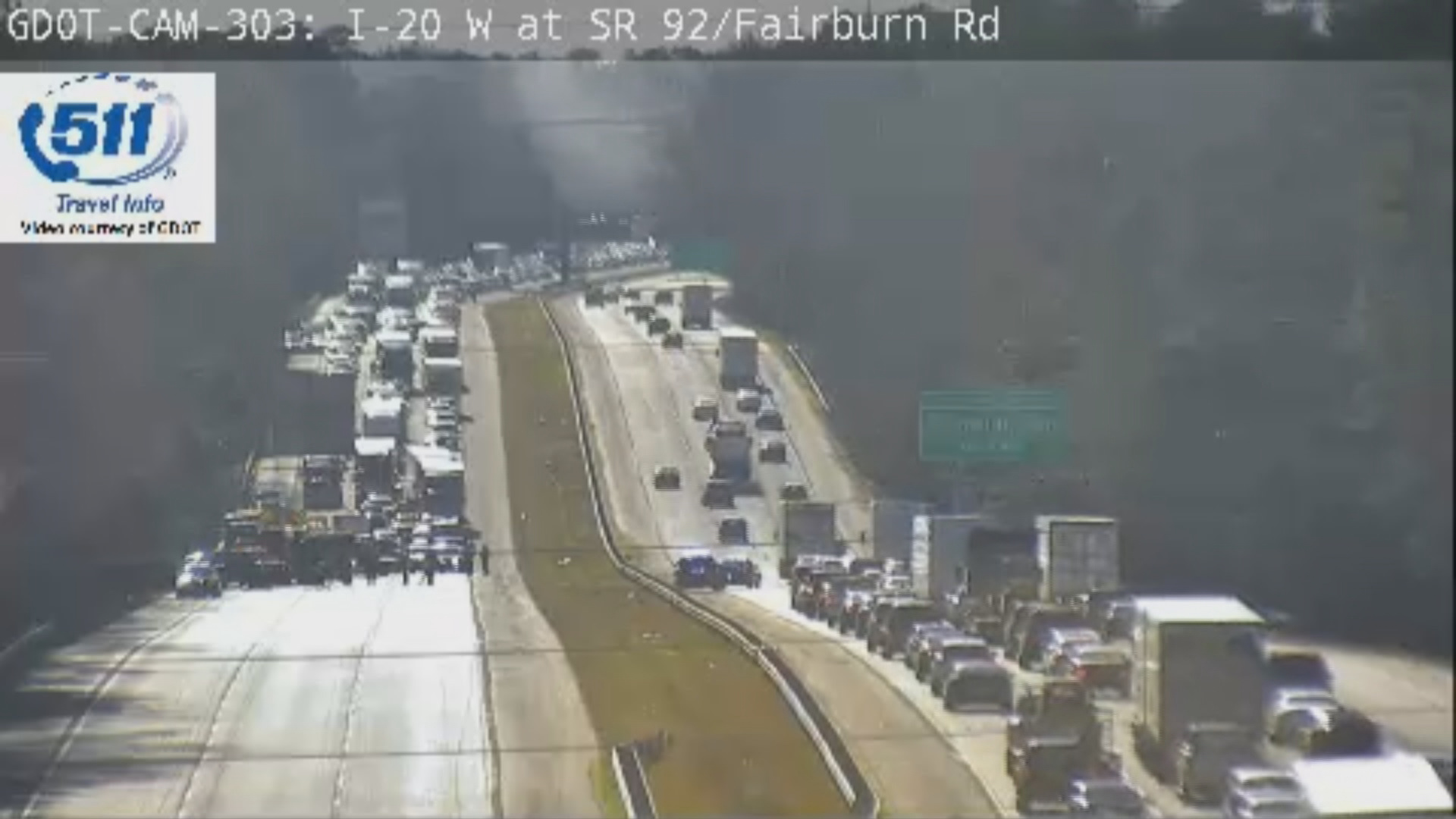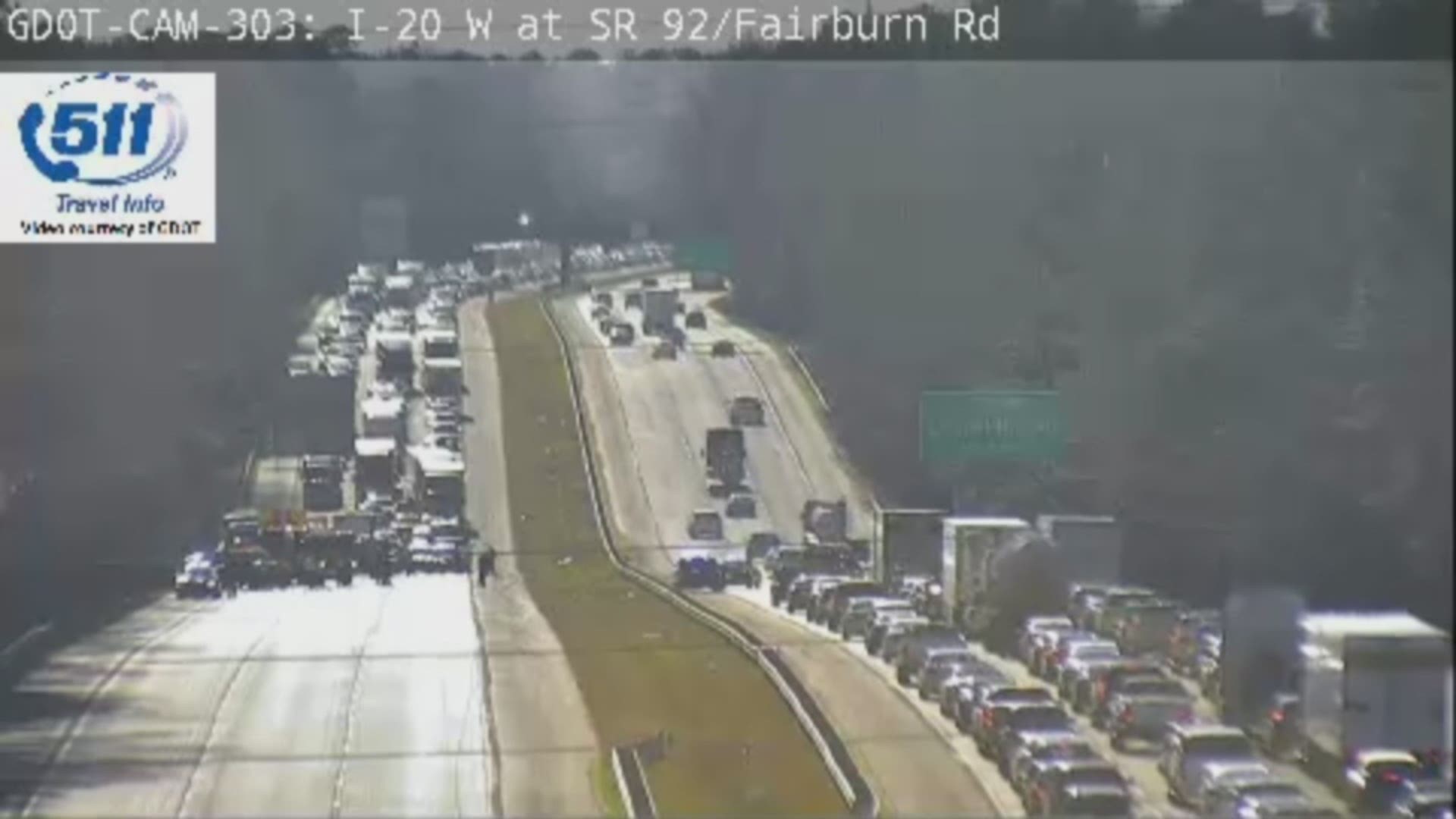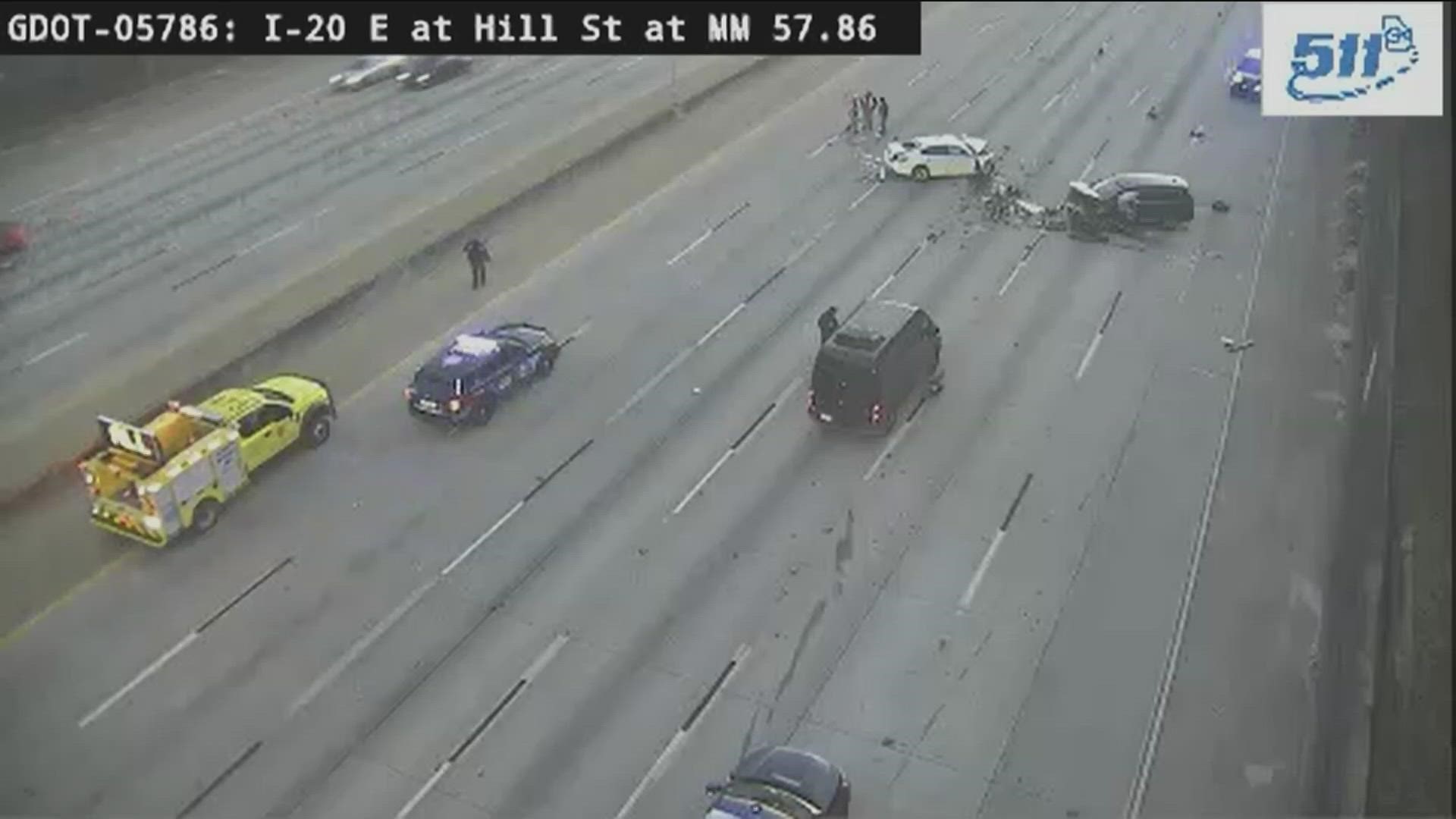When news breaks about a wreck on I-20 Douglasville today, it immediately grabs the attention of commuters, local residents, and emergency services alike. Such an event isn't just a momentary disruption; it's a complex situation with far-reaching implications, affecting traffic flow, public safety, and even the local economy. Understanding the nature of these incidents, the immediate response, and the broader context is crucial for everyone navigating our busy highways.
Major road incidents, especially those involving a significant "wreck," can cause considerable delays and pose serious risks. For those living in or traveling through Douglasville, Georgia, staying informed about such occurrences on I-20 is paramount. This article delves into what a "wreck" truly entails, the typical chain of events following such an incident, and vital information for drivers to ensure their safety and navigate potential disruptions effectively.
Table of Contents
- What Exactly is a "Wreck" on the Road?
- The Immediate Aftermath of a Wreck on I-20 Douglasville Today
- Common Causes of Highway Wrecks: A Closer Look
- The Far-Reaching Consequences: Beyond the Crash Site
- Emergency Response Protocols: A Coordinated Effort
- Navigating Traffic During a Major Incident: Tips for Drivers
- Preventative Measures and Road Safety: Minimizing Risks
- Legal and Financial Implications Following a Wreck
What Exactly is a "Wreck" on the Road?
The term "wreck" often carries a heavier connotation than a simple "accident." While both refer to unexpected and unfortunate events resulting in damage or harm, a "wreck" typically implies a greater degree of destruction or severity. As the data suggests, "a wreck is an accident in which a moving vehicle hits something and is damaged or destroyed." It's not just a fender bender; it's an event where "both the noun and verb senses of wreck typically involve things being ruined, destroyed, or violently damaged—not just slightly damaged or messed up."
Consider the difference: a minor collision might be an accident, but "a car wreck involves a crash that damages" a vehicle severely, often rendering it inoperable or beyond repair. It signifies "the remains of something that has been severely damaged or worn down." When we hear about a wreck on I-20 Douglasville today, it immediately suggests a significant incident, likely involving substantial vehicle damage, potential injuries, and considerable disruption to traffic flow. It's an event where "the destruction, disorganization, disruption, or ruin of anything by force and violence" has occurred.
The Immediate Aftermath of a Wreck on I-20 Douglasville Today
When a significant "wreck" occurs on a major interstate like I-20 near Douglasville, the immediate aftermath is chaotic and critical. The first priority is always human safety. Emergency services, including police, paramedics, and fire departments, are dispatched rapidly to the scene. Their initial actions focus on:
- Securing the Scene: This involves blocking off affected lanes, setting up cones or flares, and diverting traffic to prevent further collisions.
- Assessing Injuries: Medical personnel quickly evaluate and treat anyone involved, prioritizing those with life-threatening conditions.
- Extrication: If individuals are trapped in damaged vehicles, fire and rescue teams work to safely remove them using specialized equipment.
- Controlling Hazards: This could involve addressing fuel leaks, downed power lines, or other dangers that could escalate the situation.
For drivers caught in the vicinity, the impact is immediate: traffic grinds to a halt. Delays can stretch for hours, and alternate routes quickly become congested. The sheer volume of vehicles on I-20 means that even a single-lane closure due to a wreck on I-20 Douglasville today can ripple through the entire metropolitan area's traffic network.
Traffic Impact and Rerouting
The primary visible consequence of a major wreck is the severe disruption to traffic. On I-20, a vital artery for both local commuters and interstate travel, a significant incident can lead to:
- Gridlock: Vehicles can be stuck for extended periods, unable to move.
- Diversions: Authorities will attempt to reroute traffic onto local roads, which often aren't equipped to handle such high volumes, leading to congestion in residential and commercial areas.
- Extended Travel Times: What might normally be a 15-minute drive could turn into an hour or more.
Commuters are advised to check real-time traffic updates from reliable sources like the Georgia Department of Transportation (GDOT) or local news outlets to understand the extent of the delays and identify potential detours.
Common Causes of Highway Wrecks: A Closer Look
While each wreck on I-20 Douglasville today has its unique circumstances, many share common underlying causes. Understanding these factors is crucial for prevention and for promoting safer driving habits. Data from the National Highway Traffic Safety Administration (NHTSA) consistently points to several leading contributors to serious crashes:
- Distracted Driving: This remains a top cause. Activities like texting, talking on the phone, eating, or even adjusting the radio can divert a driver's attention from the road for critical seconds, leading to a loss of control or failure to react to changing conditions.
- Speeding: Driving above the posted speed limit, or too fast for conditions (weather, traffic, road construction), significantly reduces a driver's reaction time and increases the severity of a collision.
- Impaired Driving: Driving under the influence of alcohol or drugs severely impairs judgment, coordination, and reaction time, making it incredibly dangerous.
- Fatigue: Drowsy driving can be as dangerous as impaired driving, leading to reduced alertness and delayed reactions.
- Reckless Driving: Aggressive behaviors like tailgating, weaving through traffic, or sudden lane changes without signaling contribute to a high percentage of wrecks.
- Poor Weather Conditions: Rain, fog, ice, or snow reduce visibility and traction, making roads treacherous. Drivers must adjust their speed and following distance accordingly.
- Vehicle Malfunctions: While less common, issues like tire blowouts, brake failure, or steering problems can lead to a sudden loss of control. Regular vehicle maintenance is key to mitigating these risks.
Often, a wreck is the result of a combination of these factors, creating a dangerous chain of events on the highway.
The Far-Reaching Consequences: Beyond the Crash Site
The impact of a significant wreck on I-20 Douglasville today extends far beyond the immediate scene and the affected vehicles. These incidents have profound consequences on individuals, communities, and the economy.
The Human Toll: Injuries and Fatalities
Tragically, the most severe consequence of a major wreck is the potential for serious injuries or fatalities. Victims can suffer from a range of physical traumas, from broken bones and internal injuries to traumatic brain injuries and spinal cord damage. The emotional and psychological toll on survivors, witnesses, and the families of those involved can be immense, leading to long-term distress, anxiety, and even post-traumatic stress disorder (PTSD).
Economic Impact and Property Damage
Beyond the human cost, wrecks incur significant economic burdens. These include:
- Property Damage: Vehicles are often totaled, requiring costly repairs or replacement. Damage to road infrastructure (guardrails, signs, median barriers) also adds to the expense.
- Medical Costs: Emergency medical treatment, hospital stays, rehabilitation, and long-term care for injuries can be astronomical.
- Lost Productivity: Individuals involved in wrecks may miss work, leading to lost wages. Businesses can suffer from delayed deliveries or disrupted supply chains.
- Insurance Premiums: A higher incidence of wrecks in an area can contribute to increased insurance premiums for all drivers.
- Emergency Services Costs: The deployment of police, fire, and EMS, along with tow truck services and road cleanup crews, represents a significant cost to taxpayers.
The cumulative economic impact of road incidents on a national scale is in the hundreds of billions of dollars annually, highlighting the serious financial implications of such events.
Emergency Response Protocols: A Coordinated Effort
Responding to a wreck on I-20 Douglasville today requires a highly coordinated effort from multiple agencies. Each plays a vital role in managing the crisis and restoring normalcy:
- Law Enforcement (Georgia State Patrol, Douglasville Police Department, Douglas County Sheriff's Office):
- Secure the scene, direct traffic, and investigate the cause of the wreck.
- Document the incident for accident reports and potential legal proceedings.
- Enforce traffic laws and issue citations if necessary.
- Emergency Medical Services (EMS):
- Provide immediate medical attention to injured parties at the scene.
- Transport critical patients to nearby hospitals.
- Fire Departments:
- Respond to fires, fuel spills, or other hazardous materials.
- Perform extrication of trapped individuals from vehicles.
- Assist with scene safety and cleanup.
- Department of Transportation (GDOT):
- Manage traffic flow, set up detours, and deploy incident management teams.
- Assess and repair damage to road infrastructure.
- Clear debris and ensure the roadway is safe for reopening.
- Towing and Recovery Services:
- Remove damaged vehicles from the scene, often requiring specialized heavy-duty tow trucks for larger vehicles.
This multi-agency collaboration is essential for efficiently handling complex incidents on major highways and minimizing disruption to the public.
Navigating Traffic During a Major Incident: Tips for Drivers
When you encounter or hear about a wreck on I-20 Douglasville today, knowing how to react can keep you safe and help alleviate congestion. Here are crucial tips:
- Stay Informed: Before you leave, check traffic apps (like Google Maps, Waze), local news, or GDOT's 511 system for real-time updates. This can help you avoid affected areas entirely.
- Exercise Patience: If you find yourself in a traffic jam caused by a wreck, remain calm. Aggressive driving or attempting to cut through traffic will only worsen the situation and increase the risk of further incidents.
- Heed Emergency Personnel: Always follow instructions from police officers, emergency responders, and road crews. Their directives are for your safety and to facilitate the clearance of the scene.
- Move Over Law: Remember Georgia's "Move Over Law." If an emergency vehicle (police, fire, EMS, DOT, tow truck) is stopped on the shoulder with flashing lights, move to the farthest lane away from them if safe to do so. If you cannot move over, slow down significantly below the speed limit.
- Avoid Rubbernecking: Resist the urge to slow down and look at the wreck. This "rubbernecking" significantly contributes to secondary collisions and further traffic backups. Focus on the road ahead.
- Prepare for Delays: If you must travel through an affected area, ensure you have enough fuel, water, and any necessary medications.
Your responsible actions can make a significant difference in the efficiency of emergency response and the safety of everyone on the road.
Preventative Measures and Road Safety: Minimizing Risks
While we can't predict every wreck on I-20 Douglasville today, we can all contribute to making our roads safer. Adhering to fundamental road safety principles is the most effective preventative measure:
- Drive Defensively: Assume other drivers might make mistakes. Maintain a safe following distance, especially in adverse weather or heavy traffic.
- Eliminate Distractions: Put your phone away. Avoid eating, grooming, or engaging in other activities that take your eyes or mind off the road.
- Obey Speed Limits: Speed limits are set for a reason. Adjust your speed to conditions, even if it means driving below the posted limit.
- Never Drive Impaired: If you've consumed alcohol or drugs, arrange for a designated driver, use ride-sharing services, or take public transportation.
- Get Enough Rest: Ensure you are well-rested before long drives. If you feel drowsy, pull over in a safe location for a break or a nap.
- Regular Vehicle Maintenance: Keep your tires properly inflated, brakes in good working order, and lights functioning. A well-maintained vehicle is a safer vehicle.
- Wear Your Seatbelt: This simple act is the single most effective way to prevent serious injury or death in a crash.
Beyond individual responsibility, continuous improvements in vehicle safety technology (e.g., automatic emergency braking, lane keeping assist) and road infrastructure (e.g., better signage, improved road surfaces, intelligent traffic systems) also play a crucial role in reducing the frequency and severity of wrecks.
Legal and Financial Implications Following a Wreck
Beyond the immediate chaos, a wreck on I-20 Douglasville today can trigger a complex web of legal and financial processes. Understanding these aspects is crucial for anyone involved:
Insurance Claims and Liability
After a wreck, the primary financial concern for most individuals is dealing with insurance. Georgia is an "at-fault" state, meaning the person responsible for causing the accident is liable for the damages and injuries. This typically involves:
- Filing a Claim: Drivers involved will file claims with their own insurance companies, and potentially with the at-fault driver's insurer.
- Investigation: Insurance companies will investigate the accident to determine fault, often relying on police reports, witness statements, and photographic evidence.
- Compensation: If fault is established, the at-fault driver's insurance will typically cover property damage, medical expenses, lost wages, and other damages up to policy limits.
Navigating these claims can be complex, especially in multi-vehicle wrecks or when injuries are severe. It's often advisable to consult with legal counsel to ensure fair compensation and protect your rights.
Community Resilience and Support
Douglasville, like any community, demonstrates remarkable resilience in the face of disruptive events like a major highway wreck. Local news channels, social media groups, and community alerts quickly disseminate information, helping residents plan their commutes and stay safe. The swift and coordinated response of local emergency services reflects a dedicated infrastructure designed to handle such crises effectively.
These incidents serve as stark reminders of the importance of vigilance on the road and the critical role played by first responders. They also highlight the interconnectedness of our communities, where an event on one stretch of highway can impact thousands of lives.
Staying Informed and Safe
For the most current information regarding any wreck on I-20 Douglasville today, always refer to official sources. The Georgia Department of Transportation (GDOT) provides real-time traffic updates via its 511 system and website. Local news outlets in the Douglasville and Atlanta metropolitan areas are also excellent resources for breaking news and detailed reports. Always prioritize your safety and the safety of others by driving responsibly and remaining alert.
In conclusion, a "wreck" is far more than a minor inconvenience; it's a serious event with significant consequences. By understanding its definition, causes, and impacts, and by practicing safe driving habits, we can all contribute to making our roads, including I-20 through Douglasville, safer for everyone.
What are your experiences with major highway incidents? Share your thoughts or safety tips in the comments below. And for more articles on road safety and traffic management, explore our other content.



Detail Author:
- Name : Ashton Pfannerstill I
- Username : jaskolski.josefa
- Email : kohler.alanna@crona.net
- Birthdate : 1979-08-18
- Address : 62175 Alessandra Pine South Helga, IL 97320-3198
- Phone : (254) 481-7184
- Company : Durgan, Sipes and Miller
- Job : Marine Cargo Inspector
- Bio : Velit aliquid ipsam labore. Alias nesciunt maxime animi ut sit. Sed sed ex rem sed voluptatum et beatae. Ipsum non sint et qui velit distinctio.
Socials
facebook:
- url : https://facebook.com/camrynlittle
- username : camrynlittle
- bio : Ea magnam qui recusandae similique tempora distinctio.
- followers : 3556
- following : 1593
instagram:
- url : https://instagram.com/camrynlittle
- username : camrynlittle
- bio : Et explicabo porro illo. Explicabo voluptatem repellat qui dolores. Aspernatur velit laborum ut.
- followers : 2650
- following : 2842
linkedin:
- url : https://linkedin.com/in/camryn.little
- username : camryn.little
- bio : Accusantium at nam aut quas voluptate veritatis.
- followers : 2473
- following : 2160
twitter:
- url : https://twitter.com/little1975
- username : little1975
- bio : Exercitationem sint corporis aut eos soluta. Omnis tenetur officia consectetur eaque. Et delectus illo dolorem accusantium dolor. Facere ratione eaque quo.
- followers : 4902
- following : 1958